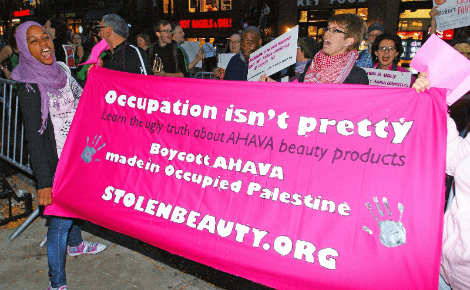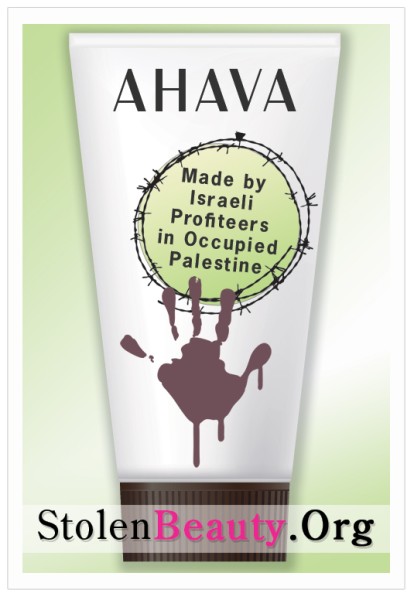Invitation from CODEPINK Women for Peace
Email Stolen Beauty and request that your name be added to the boycott endorsement listWe are writing to ask you to endorse the Stolen Beauty AHAVA boycott campaign. This boycott is directed against the Israeli company Ahava Dead Sea Laboratories, whose practices are against international law. After watching Israel’s brutal assault on Gaza in 2008-2009, after seeing the misery caused in Gaza by the continuing blockade, reading about the home demolitions in East Jerusalem, and the land appropriations and violent repression in the West Bank, we at CODEPINK Women for Peace have joined the International Boycott, Divestment, and Sanctions Movement for Palestine, and the Stolen Beauty Campaign is our focused contribution. We are seeking to create more interfaith allies in this campaign—will you join the dozens of rabbis, reverends, and other clergy who have signed on?
WHERE’S THE LOVE?
Ahava Dead Sea Laboratories is a privately held Israeli cosmetics company that manufactures products using minerals and mud from the Dead Sea. The Hebrew word “Ahava” means love, but there is nothing loving about what the company is doing in the Occupied Palestinian territory of the West Bank.
LITERALLY STEALING BEAUTY
The company’s main factory and its visitors’ center are located in the Israeli settlement of Mitzpe Shalem in the Occupied Territory of the Palestinian West Bank. Ahava products are labeled as of ‘Israeli origin,’ but according to international public law, including the relevant UN Security Council Resolutions, the West Bank cannot be considered to be part of the State of Israel. Not only does Ahava profit from the occupation by locating its main plant and store in an illegal Israeli settlement, it also uses in its products mud from the Dead Sea, excavated in an occupied area, and thus it exploits occupied natural resources for profit. The fourth Geneva Convention explicitly forbids an occupying power from removing the captured natural resources for its own use, and we see this as another charge for which this company should be held accountable. The company is 43% owned by the settlements of Mitzpe Shalem and Kalia, which means that AHAVA’s profits are directly subsidizing these two illegal settlements.
Public pressure against illegal settlement goods in general and Ahava in particular has increased during the past three months. In April, Vita, a major retail chain in Norway, announced that it would no longer stock Ahava products. In early May, the United Methodist Church voted to boycott illegal Israeli settlement products including Ahava; in July, the Presbyterian Church (U.S.A.) adopted a similar boycott. In mid-May, the South African Minister of Trade announced that Ahava in particular and settlement products in general would no longer be allowed the “Made in Israel” label. Denmark followed suit with a similar announcement one week later. A few days later, Migros, a Swiss retailer, said they would begin labeling settlement goods as products of “Israeli settlement zone West Bank.” There was an excellent blog post on TIME covering much of the labeling row, and most of the press coverage about the settlement goods controversy featured Ahava as the poster child.
In June, the Israeli research organization Who Profits released a new report entitled “Ahava: Tracking the Trade Trail of Settlement Products.” All this is to say that the push to hold Ahava accountable for its violations of international law is snowballing.
SUPPORT PALESTINIAN CIVIL SOCIETY AND JEWISH ALLIES
In July 2005, a broad range of Palestinian Civil Society organizations issued a call for Boycott, Divestment, and Sanctions Against Israel as part of a non-violent campaign to end the Israeli occupation of the West Bank, Gaza, and East Jerusalem. You can show your opposition to Israel’s occupation by participating in a consumer boycott of Israeli goods and services.
There is, in fact, a growing movement within the North American Jewish community calling for the boycott of settlement products as a means to end Israel’s oppressive occupation. Many Jewish leaders, we among them, are horrified by the ongoing confiscation of Palestinian land, the destruction of Palestinian cisterns and wells, the bulldozing of entire communities, and the violence of settlers who target Palestinians and their property for almost daily attacks. Members of the Jewish community are increasingly voicing support for nonviolent popular resistance against these misdeeds, including the kind of cautious, targeted boycott that the Presbyterian Church is preparing to undertake. For example, in June, 2012, former Speaker of the Israeli Knesset and World Zionist Organization leader Avraham Burg declared his support for settlement boycott in an article in The Independent. Former Israeli Foreign Ministry director Alon Liel made public his boycott of settlement goods and support for South Africa’s new “plan to ban ‘Made in Israel’ labels for imported products from the West Bank, protesting what he calls Israeli complacency about the occupation.” In March 2012, Jewish-American professor at the City University of New York Peter Beinart published a New York Times op ed, entitled “To Save Israel, Boycott the Settlements”.
Despite claims to the contrary, a principled stand for dignity, justice, and equality for all in Israel and Palestine is not anti-Semitic. To boycott settlement goods is not anti-Semitic. To criticize Israeli government policy is not anti-Semitic. In fact, holding Israel to account for its violations of international law is the responsibility of all people of faith, whether Jewish, Christian, Muslim, or of any other creed.
JOIN US!
We have chosen Ahava Products for our boycott because they are widely stocked in cosmetics stores and pharmacies, and because the practices of the company are against international law. We are hoping you will join us in boycotting Ahava and in supporting human rights and an end to a brutal occupation. Please contact us at nancy@stolenbeauty.org if you would like to endorse our STOLEN BEAUTY boycott campaign on Ahava products. We’ll keep you posted on various ways to participate in the campaign.
In sisterhood and struggle,
Rae Abileah and Nancy Kricorian
Stolen Beauty Ahava Boycott Campaign
CODEPINK Women for Peace
For more information on our campaign, recent protest events, and more, go to www.stolenbeauty.org.
For more information on the manufacturer and its involvement in the occupation, go to “Who Profits from the Occupation?” (a project of The Israeli Coalition of Women for Peace). This group has recently released a special report on Ahava.
Read the argument for boycott endorsed by the Presbyterian Church (U.S.A.) 220th General Assembly in July 2012.











Pingback: Ahava – Stolen Beauty | ahavastolenbeauty